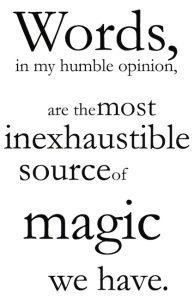Minutiae. Don’t you love how the word sounds coming off your tongue? Say it out loud, mi-nyoo-she-aye.
I love words. I don’t know why, I wasn’t a bookish kid. Perhaps it came from feelings of not being heard when I was younger, of being misunderstood. I used to yell a lot. I was the queen of the temper tantrum as a child. Now I tend to use words, rather than volume, to make my voice heard. (Admittedly, I can be just an annoying to argue with, but at least I’m quieter.)
I’m no poet, but I love those who are. I love wordplay. I love wit, I love the rhythm and articulation of words. And I love the power of words.

I don’t use words to sound smart — and if I do, I’m found out because it will come off sounding as pretentious as it is. I use words to express myself. Feelings, for example, are often layered, full of contradiction and nuance. I don’t paint, I can’t dance, so I rely on words to express these things. Lots of words, specific words, precise words.
It’s easy to learn words. Anyone who can read can do it. Reading is, in fact, the key to growing one’s vocabulary.
It’s fascinating to me how words seem to belong to particular settings. We’re accustomed to a kind of conformity and so words meant for one setting sound out of place in another. The language that fills the space around the table in a executive boardroom is not the same as than the one used at a church meeting. An economist will discuss the data differently than a treasurer. A TED Talk sounds different than a sermon. But here’s the thing, our thoughts are deeply influenced by the words we use to express them, so why not stand in the face of convention — risk sounding a li’l different — and embrace the power of words? Change up your language, and you may find your way into enhanced understanding. Choose new words and you can begin to communicate stale or discarded ideas in new ways.
Words are never more powerful than when they are collected together into a story. Narratives can reach across communication chasms of all kinds — age, ethnicity, professions. The use of myth and metaphor, analogy and parable, memoir and imagination have endured because they speak to us in ways that, in their simplicity, hold so much meaning. A surgeon speaks to the traumatized family of a man who has just undergone emergency open heart surgery; she deftly compares the workings of the heart to a busy intersection and the torn valve to a broken traffic light. And they understand.
Words. Learn them, delight in them, share them. And, most of all, listen to them. The interplay of words can surely open us to a rich exchange of thoughts and ideas, but the key to unlocking that richness is still and always in the listening.


Reblogged this on Shelley Marie Motz and commented:
I love this post by Intersecting Terry. Do you love words, too? What’s your favourite? Here are a few of mine: serendipity, heartfelt and verdant.
LikeLike
Beautiful. I hope you don’t mind if I reblog this. Would love to spark a wider discussion about the power of words.
LikeLike